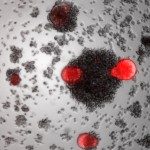Link to Pubmed [PMID] – 22983165
J Biomol Screen 2013 Feb;18(2):172-9
Chikungunya virus (CHIKV) is a mosquito-transmitted pathogen responsible for an acute infection of abrupt onset, characterized by high fever, polyarthralgia, myalgia, headaches, chills, and rash. In 2006, CHIKV was responsible for an epidemic outbreak of unprecedented magnitude in the Indian Ocean, stressing the need for therapeutic approaches. Since then, we have acquired a better understanding of CHIKV biology, but we are still missing active molecules against this reemerging pathogen. We recently reported that the nonstructural nsP2 protein of CHIKV induces a transcriptional shutoff that allows the virus to block cellular antiviral response. This was demonstrated using various luciferase-based reporter gene assays, including a trans-reporter system where Gal4 DNA binding domain is fused to Fos transcription factor. Here, we turned this assay into a high-throughput screening system to identify small molecules targeting nsP2-mediated shutoff. Among 3040 molecules tested, we identified one natural compound that partially blocks nsP2 activity and inhibits CHIKV replication in vitro. This proof of concept suggests that similar functional assays could be developed to target other viral proteins mediating a cellular shutoff and identify innovative therapeutic molecules.

